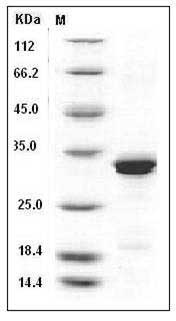-
Product Name
Human Amyloid beta A4 protein (His & GST Tag)
- Documents
-
Description
Amyloid precursor protein (APP) is a type I transmembrane protein expressed in many tissues and concentrated in the synapses of neurons, and is suggested as a regulator of synapse formation and neural plasticity. APP can be processed by two different proteolytic pathways. In one pathway, APP is cleaved by β- and γ-secretase to produce the amyloid-β-protein (Aβ, Abeta, beta-amyloid) which is the principal component of the amyloid plaques, the major pathological hallmark of Alzheimer’s disease (AD), while in the other pathway, α-secretase is involved in the cleavage of APP whose product exerts antiamyloidogenic effect and prevention of the Aβ peptide formation. The aberrant accumulation of aggregated beta-amyloid peptides (Abeta) as plaques is a hallmark of AD neuropathology and reduction of Abeta has become a leading direction of emerging experimental therapies for the disease. Besides this pathological function of Abeta, recently published data reveal that Abeta also has an essential physiological role in lipid homeostasis. Cholesterol increases Abeta production, and conversely A beta production causes a decrease in cholesterol synthesis. Abeta may be part of a mechanism controlling synaptic activity, acting as a positive regulator presynaptically and a negative regulator postsynaptically. The pathological accumulation of oligomeric Abeta assemblies depresses excitatory transmission at the synaptic level, but also triggers aberrant patterns of neuronal circuit activity and epileptiform discharges at the network level. Abeta-induced dysfunction of inhibitory interneurons likely increases synchrony among excitatory principal cells and contributes to the destabilization of neuronal networks. There is evidence that beta-amyloid can impair blood vessel function. Vascular beta-amyloid deposition, also known as cerebral amyloid angiopathy, is associated with vascular dysfunction in animal and human studies. Alzheimer disease is associated with morphological changes in capillary networks, and soluble beta-amyloid produces abnormal vascular responses to physiological and pharmacological stimuli.
-
Protein short names
ADAP; PN-II; AL024401; AAA; ABPP; E030013M08RIK; PROTEASE NEXIN II; PN2; CVAP; AG; CTFGAMMA; ABETA; AD1; APPI; APPICAN; BETAAPP
-
Source/Expression Host
E. coli
-
Expression Plasmid/cDNA
A DNA sequence encoding the amino acids (Asp 672-Val 711) of human Amyloid beta A4 protein (APP770) (P05067-1), corresponding to the Beta-amyloid protein 40, was fused with the N-terminal polyhistidine-tagged GST tag at the N-terminus.
-
Protein Species
Human
-
Molecular weight
The recombinant human Beta-APP40/GST chimera consists of 278 amino acids and has a calculated molecular mass of 31.8 kDa. It migrates as an approximately 33 kDa band in SDS-PAGE under reducing conditions.
-
Purity
> 92 % as determined by SDS-PAGE
-
Activity
Measured by its ability to bind biotinylated recombinant human AGER (Cat:503381) in a functional ELISA.
-
Validations

Human Beta-amyloid 40 / Beta-APP40 Protein (His & GST Tag) SDS-PAGE
Related Products / Services
Please note: All products are "FOR RESEARCH USE ONLY AND ARE NOT INTENDED FOR DIAGNOSTIC OR THERAPEUTIC USE"
